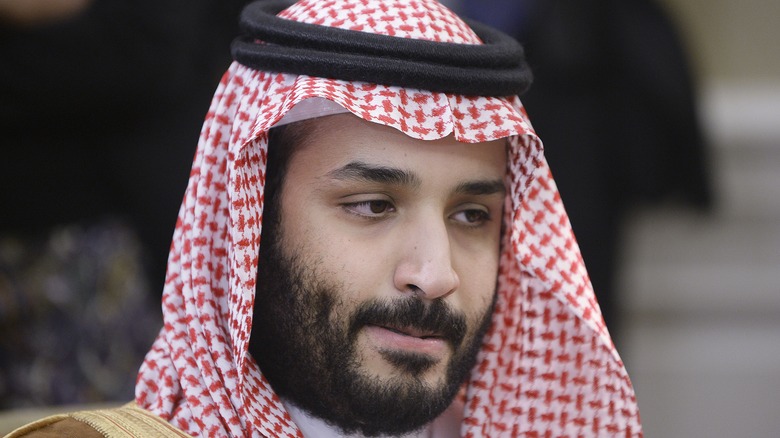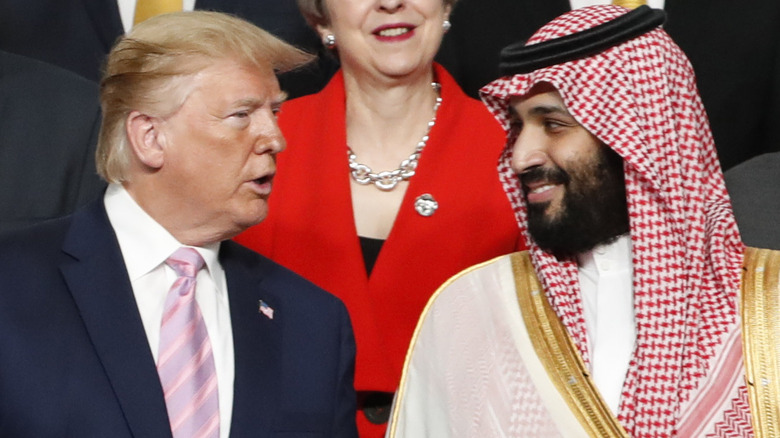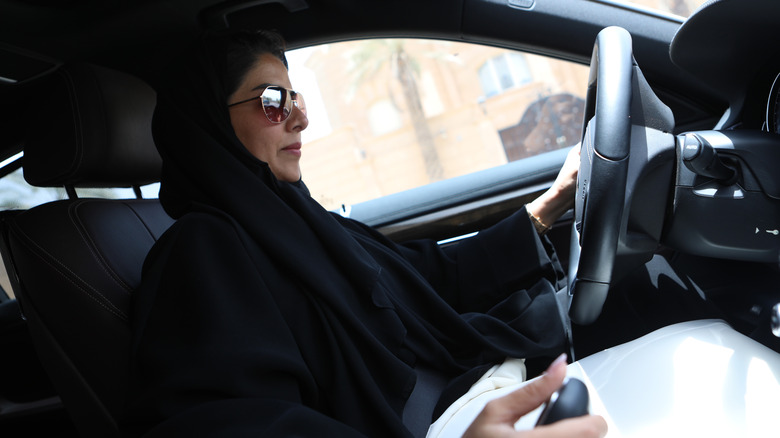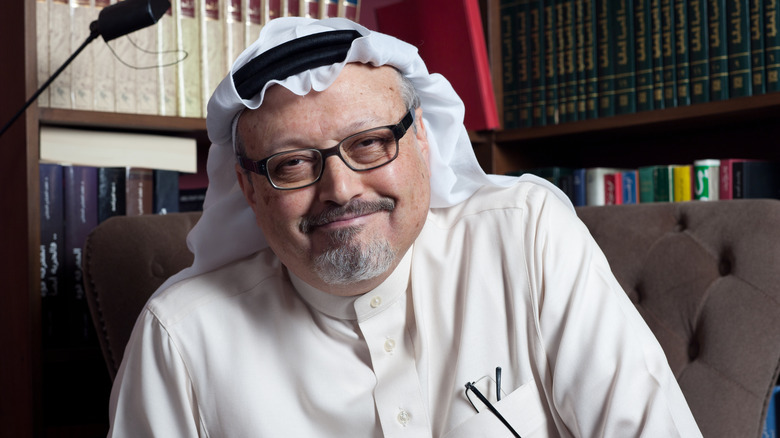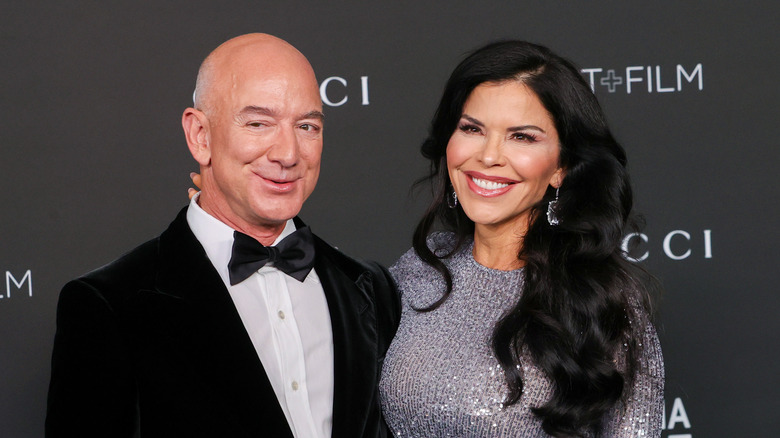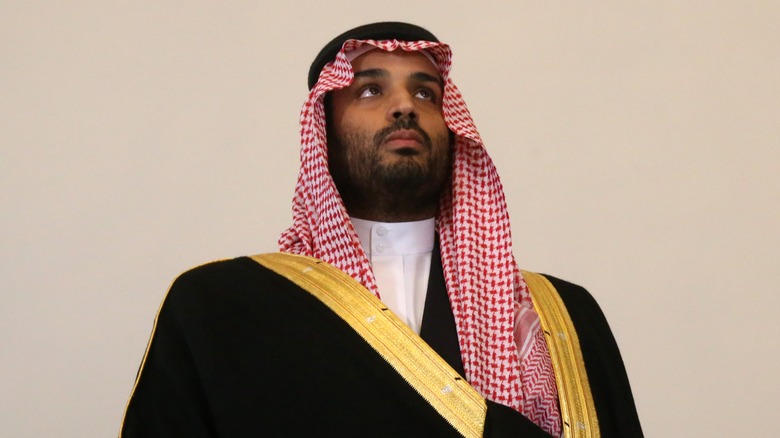The Untold Truth Of Saudi Prince Mohammed Bin Salman
Crown Prince Mohammed bin Salman of Saudi Arabia, colloquially known as MBS, is the effective leader of the Saudi kingdom. The 36-year-old heir will ascend to the throne following the death of his father, 85-year-old King Salman bin Abdulaziz al-Saud. However, due to the poor health of the king, Crown Prince Mohammed bin Salman has taken on nearly every aspect of ruling the country. The young leader has fashioned himself as a reformer in the country, who embraces technological change and Western culture, often taking selfies with Saudi citizens and posting them on social media. However, he's not afraid to use the tremendous resources of the royal family, either. He's also known for his lavish spending, which includes a $500 million yacht, a $450 million Leonardo da Vinci painting, and a $300 million French chateau, according to Business Insider.
In just a short time since being named crown prince by his father in June 2017, MBS has been praised by Western leaders for some of the reforms he has implemented in the conservative Gulf country, including lifting the ban on women driving and attempting to diversify the Saudi economy beyond oil production. At the same time, Prince Mohammed bin Salman has been criticized for a number of concerning moves, including launching a siege on neighboring Yemen that has caused an ongoing humanitarian crisis, cracking down on domestic dissent, and allegedly being involved in the murder of Saudi journalist Jamal Khashoggi.
Prince Mohammed bin Salman prioritized charming the U.S.
Within months of being named crown prince, MBS began planning a highly publicized three-week tour of the U.S. that began in March 2018 with a meeting at the White House with then-president Donald Trump. However, a leaked copy of his itinerary showed that his trip was more about his image than about diplomacy with Washington officials, per The Independent. MBS met with journalists, media moguls, Silicon Valley leaders, academics, and some of the biggest players in the world's economy.
Over the course of those three weeks, MBS met with former president Bill Clinton, former New York City Mayor Michael Bloomberg, Microsoft founder Bill Gates, Tesla CEO Elon Musk, and Apple CEO Tim Cook, among other political and business leaders. In entertainment and media, Salman raised some eyebrows by taking meetings with Dwayne "The Rock" Johnson, News Corp. founder and CEO Rupert Murdoch, and media mogul Oprah Winfrey. "Saudi Arabia has always had a public image problem in the West because of the obvious things like women's rights and beheadings," Nader Hashemi, director of the Center for Middle East Studies at the University of Denver, told The Independent. "When you meet with Oprah, even if you're not going to be interviewed, you're seeking the approval of an opinion maker. You're going into people's homes and reaching deep into American culture."
Women can legally drive now, but they still face severe restriction
Nearly as soon as Prince Mohammed bin Salman was named the heir to the throne, he announced what appeared to be a progressive agenda, saying he would revitalize the kingdom's economy beyond oil, allow movie theaters and live music, and lift the ban on women driving themselves in the country. According to The New York Times, one year later, Saudi Arabia had issued more than 70,000 driver's licenses to women, and several driving schools for women had opened across the country.
However, under Saudi Arabia's strict guardianship laws, women live under immense control by the government and the men in their families. Under the guardianship system, a girl's father is her legal guardian. After a woman gets married, that guardianship transfers to her husband. And if he dies, her son or another male family member becomes her guardian. Women who disobey the commands of their guardian can be arrested, according to Human Rights Watch, which views the system as a clear violation of human rights. For his part, MBS believes human rights are in the eye of the beholder. "Saudi Arabia believes in many of the principles of human rights. In fact, we believe in the notion of human rights, but ultimately Saudi standards are not the same as American standards," Prince Mohammed bin Salman told 60 Minutes.
MBS likely ordered the murder of Jamal Khashoggi
On October 2, 2018, Jamal Khashoggi — a 59-year-old Saudi dissident, journalist, and columnist for The Washington Post — was allegedly assassinated by agents of the Saudi government at the Saudi consulate in Turkey. Khashoggi was lured to the consulate in Istanbul under the guise of providing paperwork to prove his divorce so he could get remarried. But when he arrived, he was ambushed, suffocated, and dismembered by a 15-person assassination team, according to The Washington Post. Khashoggi's final moments are captured in audio recordings and Turkish investigators concluded that Khashoggi had been strangled within minutes of arriving at the consulate.
For more than two weeks, the Saudi government denied any knowledge of what happened to Khashoggi. Saudi Crown Prince Mohammed bin Salman told Bloomberg News [via the Associated Press] that Khashoggi left the consulate after "a few minutes or one hour," adding that they had "nothing to hide." However, Saudi officials were engaged in an extensive effort to cover up the killing, including destroying evidence. After Turkish investigators provided extensive evidence, the Saudi government finally admitted that Khashoggi had been killed in a premeditated murder, but denied that the killing took place on the orders of bin Salman. In February 2021, the Central Intelligence Agency released a report that concluded "with a high level of confidence" that the operation was carried out at the direction of MBS, per The Guardian.
Crown Prince Mohammed bin Salman probably hacked Jeff Bezos' phone
Also in 2018, Amazon founder Jeff Bezos received an unexpected message on WhatsApp from Prince Mohammed bin Salman. The two had exchanged contact information during the crown prince's U.S. tour earlier in the year at a small dinner in Los Angeles. Since then, Bezos had only received a promotional video from MBS that promoted Saudi Arabia's economy. However, this message was markedly different. It had an attachment of a single image of a woman who looked like Lauren Sanchez — the woman with whom Bezos had been having an (at that time) unreported affair.
The message was interpreted by Bezos as blackmail for the unflattering coverage Saudi Arabia and MBS had received in the Bezos-owned Washington Post. But how did Mohammed bin Salman know about the affair? The original video file was likely loaded with malware, according to investigators, per CNN, who indicated that the crown prince's own WhatsApp account had been used to hack Bezos' phone. "The information we have received suggests the possible involvement of the Crown Prince in surveillance of Mr. Bezos, in an effort to influence, if not silence, The Washington Post's reporting on Saudi Arabia," said UN investigators Agnes Callamard and David Kaye, according to Vox. Neither Jeff Bezos, nor the cybersecurity firm he hired to conduct the device investigation, have commented publicly on the matter, but Saudi Arabia denied any involvement, per usual.
For more than two years, MBS led a purge against powerful, rich Saudis
In early November 2017, nearly 400 of Saudi Arabia's most powerful people — including tycoons, government ministers, and members of the royal family — were rounded up and detained in the Ritz-Carlton hotel, in what became the biggest and most contentious purge in the modern kingdom's history, according to NBC News. Establishment figures who were previously viewed as untouchable were now targets for arrest and subject to having their assets seized, statuses wiped away, and business empires destroyed. Prince Al-Waleed bin Talal, one of the wealthiest individuals in Saudi Arabia, was held captive for 83 days. The government demanded he pay $6 billion for his release, The Wall Street Journal later reported.
All of it was allegedly masterminded by Crown Prince Mohammed bin Salman, who said it was part of a larger crackdown on rampant corruption in the kingdom. Although the sweep did capture as much as $800 billion, which may or may not be linked to corruption, according to The Economist, others say it was a clear-cut case of a power grab by MBS. "This was a shakedown operation and a power consolidation operation," one former senior U.S. official told NBC News. The official added that the detentions were meant "to remind people going forward that their wealth and their well-being would depend on the crown prince and not anything else, which is why it was so upsetting for many in the royal family."
